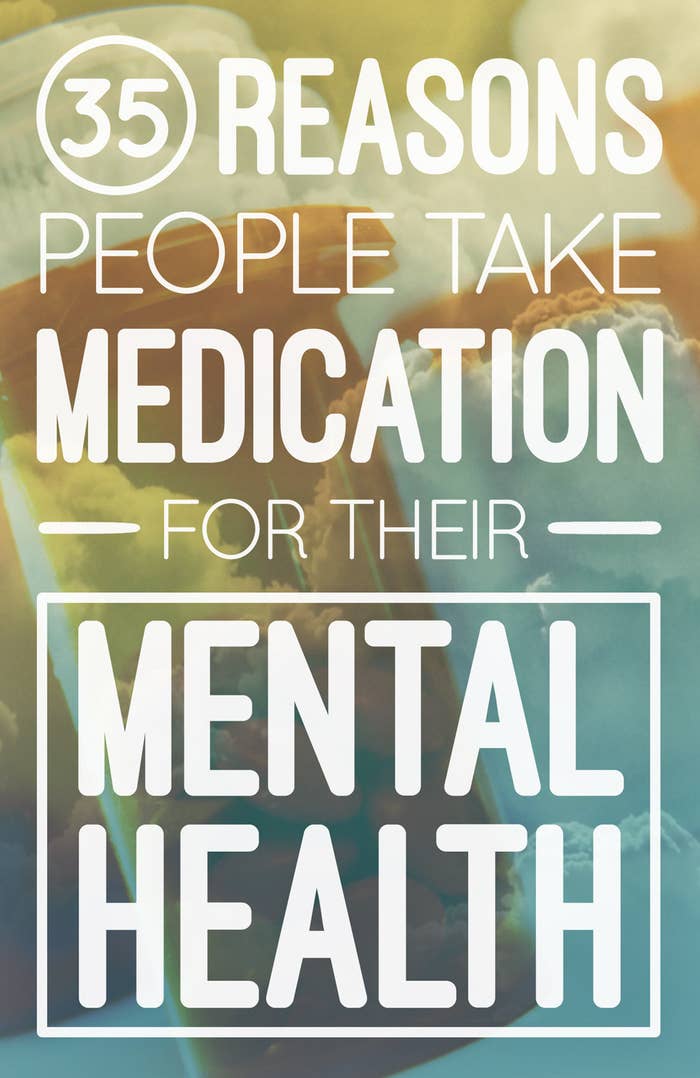
We recently asked members of the BuzzFeed community to tell us how medication helps their mental health. These are just some of the many varied responses.
(Always consult with your doctor about your personal health and wellness. BuzzFeed posts are for informational purposes only and are no substitute for medical diagnosis, treatment, or professional medical advice.)
1. Because therapy on its own wasn't working anymore.
I've battled generalized anxiety disorder and depression for eight years. I went on medication — something that always seemed like a last resort — because therapy wasn't enough for me anymore. I was tired of the plaguing self-doubt and horrible thoughts that came to me at night when I was alone. It was probably one of the hardest decisions of my life since it meant admitting I wasn't getting better but rather, worse. But because of the anti-anxiety meds and the antidepressants, I got my life back on track, moved to a whole new city, and have been able to lead a somewhat normal life.
—Stephanie H., email
2. Because it helps her be her best.
I love who I am on my Lamictal. My son and my husband get me at my best. I get to live my life not being depressed or hypomanic for months on end. I get to be a good friend to people. I'm not trapped in my mind.
—TeKiesha Brady, Facebook
3. Because panic attacks made parenting impossible.
Before I had my first child, I thought I just worried a lot. I had my first panic attack when she was only 4 months old, because I was afraid for her safety. I stopped going to the movies because I was afraid. I stopped going to the mall because I was afraid. I looked over my shoulder every second of every day because I was afraid. I wasn't living my life the way I wanted to, and my marriage was beginning to suffer as well as my ability to be a mother to my infant daughter. My doctor prescribed Paxil and it changed my entire life. It doesn't erase my anxiety but just makes it manageable; I still worry here and there, but instead of letting that worry take over my entire body, I am able to put it in a box and push it aside.
—Sara, email
4. Because it helps her focus on her dreams.
I'm on Prozac for anxiety and depression. I don't see them any differently than I see other medicine — no one tells an asthmatic they just need to take a deep breath and they'll be fine. Without the medicine, I'm irritable, unstable, and I can't even enjoy the things I like. For example, I love art, particularly photography, and ever since I was little I've dreamed of doing something creative with my life. When I'm on my meds, I can focus on those goals ahead, do my work and study. I get inspired and I really look forward to my future.
—Amelia Allen, Facebook
5. Because graphic intrusive thoughts were ruining her happiest moments.
I take Wellbutrin for OCD. My mind has a problem filtering thoughts, so I'm often attacked with graphic intrusive thoughts. In the past, I have had repetitive intrusive thoughts about me hurting myself with a knife, and thoughts about being terminally ill. If I think of something happy, my mind swoops in and I suddenly experience a negative intrusive thought. Medication has saved me from myself, and has brought an amazing sense of clarity. It quiets the thoughts in my mind and allows me to think for myself.
—Anonymous, email
6. Because he wanted to spend his nights sleeping, not crying.
I was finishing up my first physical in years, and when we were about done, the doctor asked me if I had any questions about my health. I blurted out that I had been panicky and depressed and had been crying nearly every night. I also had many weekly bouts of insomnia. He said it sounded like generalized anxiety disorder, and he started me on Buspar. It's not a narcotic. It doesn't make me a zombie. It has seemed to stabilize my mood, help me sleep better, and significantly reduce my panic attacks. These stigmas are preventing people from getting the help they truly need.
—Jason Pleasant, email
7. Because hypochondria was controlling her life.
I take an SSRI for hypochondria and health anxiety. Hypochondria isn't just exclaiming your headache is a tumor and laughing about it; it's more like staying up all night searching the internet, convincing yourself you have symptoms, then your brain actually creating those symptoms, being exhausted at work because you haven't slept, having panic attacks when you feel a new symptom you just know is the final clue to whatever your trigger is, and trying to come to terms with an illness you don't even have. Lexapro has solved it for me. I feel so free from fear.
—Alyssa Kate Pierce, Facebook
8. Because depression made her feel like a drone.
I take a multipronged approach to my anxiety and depression: regular exercise, talk therapy when I need it, and low doses of two medications. It keeps me in the game. I feel like myself again. Meds don't give you a high, or make you a drone. Depression makes you a drone. Meds can help you rediscover what it means to be active and social and able to handle your own stuff.
—Katherine Heasley, Facebook
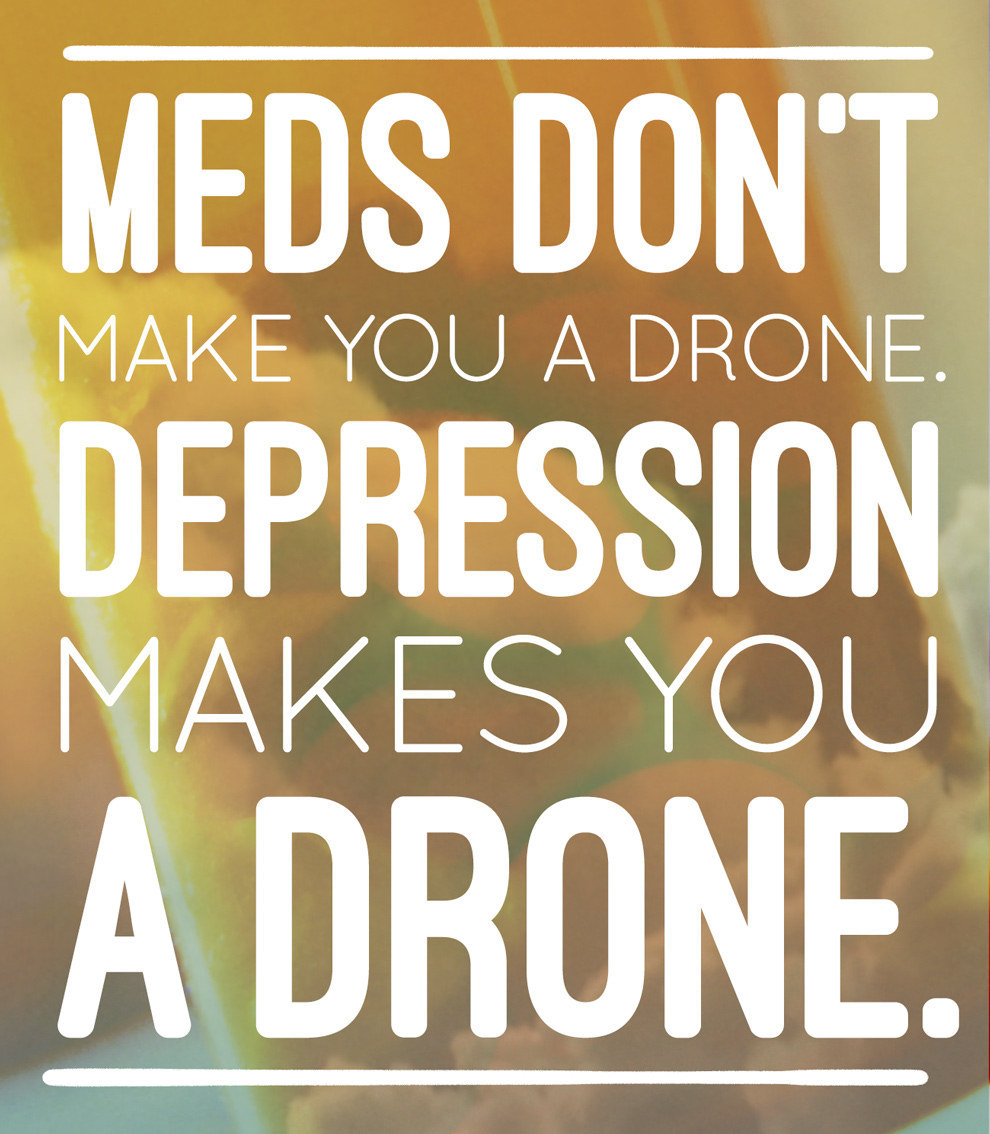
9. Because anxiety kept him from enjoying life.
Ever decide you're going out with some friends, you're going to meet them at the club, get dressed, get to the front of the club, and then turn around and go home because of your anxiety? I have, and I used to WORK AT THE CLUB HOSTING EVENTS! The fact that my mind was constantly worrying about things it shouldn't, that I was having trouble sleeping, that I couldn't even believe I was happy — they weren't normal struggles. I'm 30; I live in New York; I have a cool job, great friends, and a loving family. I decided to try medication because I want to be able to enjoy it.
—Sheik, email
10. Because postpartum depression gave her suicidal thoughts.
I wound up with postpartum depression after the birth of my daughter, and it just kept getting worse and worse. After dealing with uncontrollable anger and hiding my tears from her for three years, I finally hit my limit. When I found myself thinking that I was doing a terrible job as a mother and that she would be better off without me, I knew it was time for help. One severe depression diagnosis and three antidepressant prescriptions later, I am doing a million times better. I talk about it as much as possible, because I'm tired of hearing depression treated as a joke.
—Julie Winkler, email
11. Because meds and ECT give her the freedom to develop healthy habits.
I have atypical depression. I'm also treatment-resistant. That means medications often do not work, or may work for some time then unexpectedly stop being effective. This has caused me to have to change medications frequently, and now I'm on a medication combo while receiving electroconvulsant therapy (ECT). Medications and ECT help me to be a person and the allow me to treat my illness. I still need to practice good mental-health hygiene, take care of my physical health, and go to regular therapy appointments. Mental health medications and ECT are tools to help me overcome the physical symptoms of my depression so that I can work on the behavioral and emotional components of my illness.
—sashab40859da03, BuzzFeed
12. Because nightmares kept him from sleeping after two tours in Iraq.
I've been taking Venlafaxine daily for several years now. After my second tour in Iraq, I came home and started having severe anger issues. I didn't sleep much, and when I did, I had terrible nightmares. Shortly after moving in with a wonderful woman, I began having panic attacks at work. I'd been avoiding it because I wanted to avoid the stigma, but I finally called the veterans crisis line. They talked me through things with no judgment whatsoever, and arranged for me to see a psychiatrist at the local VA hospital. She immediately saw that I was suffering from PTSD. We tried a few medications and therapies until we found what works for me. I still have occasional bad dreams, and my fuse is still shorter than I would like, but I haven't had a panic attack in a long time, and I am able to control myself before I do anything I'll regret. That wonderful woman I met stuck by me and she is now my lovely wife. I doubt that I will ever be the same as I was before, but I manage now, and most days are all right. I wish I had reached out for help sooner.
—Anonymous, email
13. Because she couldn't stop feeling like everything was her fault.
I am a 26-year-old woman and I take Lexapro for anxiety. I take it because, after two years of therapy, I still needed help realizing that everything wrong in the world wasn't my fault. My therapist said that my serotonin levels might be low, and that as great as I was doing in therapy, this medicine might be the last piece of the puzzle. And she was right — I've never felt better.
—Danielle Manente, email
14. Because she was ready for some relief.
There is a history of mental illness in my family, so it was really no surprise when I slipped into a major depressive episode in 2012. It was partially caused by my genetic predisposition, but also brought on by my environment. Before medication, I couldn't get to a place to even start healing. I became completely socially isolated and dropped 20 pounds. I had no appetite at all. That's when I knew I needed extra help outside of therapy. I remember the day I went to pick up my medication (I'm currently taking Citalopram) from the pharmacy. I sat in my car, in the parking lot crying hysterically, thinking, I am finally going to have some relief.
—Kayla Morgan, email
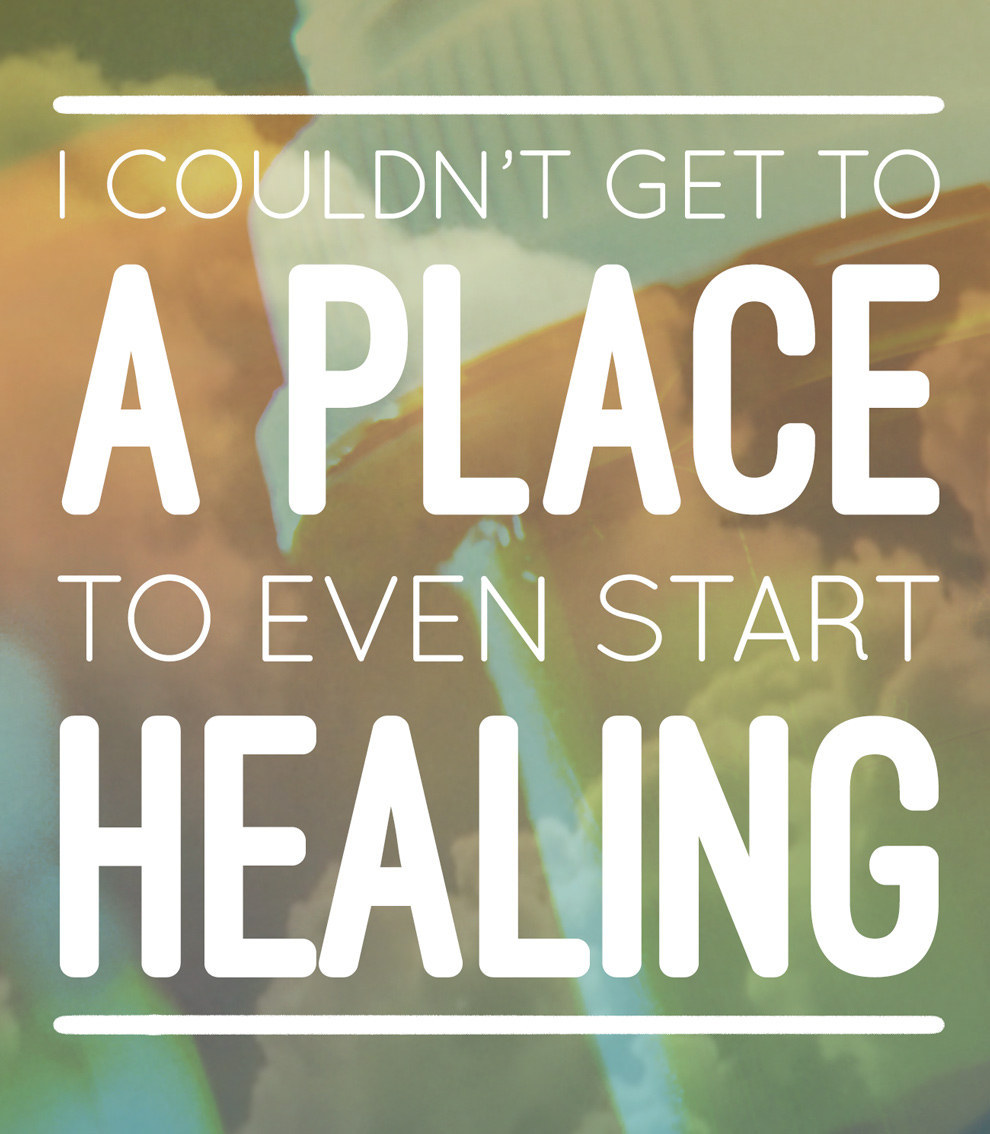
15. Because she needed help getting through a rough patch.
It wasn't until I was 20 years old that I finally admitted I was suffering from depression. I was put on Citalopram for a trial period of nine months. In those nine months I transferred colleges (for a good reason), visited Israel on the Birthright program, and lost my great aunt to breast cancer. I wasn't a zombie. The change wasn't noticeable to me during the process. After the nine months, I decided not to continue because I felt better, and I was fortunate to have a smooth process coming off of it.
When you think "depression," you could think suicidal, asylums — but that's not always true. It's all right to explore your options when you're going through a rough patch and talk to someone who can put you in the right direction toward a better life. I am now about to turn 25 and I have never looked back.
—Liz, email
16. Because anxiety medication gets her body out of "fight mode."
While I do have extremely anxious thoughts, I also have been working on becoming a very positive person. While I consider my "normal self" to be very relaxed, the symptoms of my anxiety are mostly physical, and begin when I wake up in the morning. I get an extremely upset stomach, my heart rate increases, my chest tightens, and I find it hard to breathe. Sometimes this can last the entire day. Taking anxiety medicine helps to relieve that tendency of my body to go into "fight" mode. It's a very hard thing to control just through yoga, or breathing exercises, etc.
—Caitlin P., email
17. Because PMDD made her moods unmanageable.
I was in high school when I started taking hormones for PMDD, a mood disorder associated with menstrual cycles. At first I was ashamed of this, but I soon discovered that medication was just a part of my story. My struggles with anorexia, depression, anxiety, and self-harm have led me down a steep ledge of uncertainty, but medication — along with therapy and faith — has saved my life. Not only because it keeps me breathing, but also because it keeps me grounded, clearheaded, and confident.
—Katharyn Stong, email
18. Because ADHD made it almost impossible to focus.
I've been prescribed Ritalin to manage my ADHD since the fourth grade. As someone who goes to a competitive college and does well, I find that people who learn about my ADHD usually assume I'm just taking the Ritalin to cram for exams or study harder. What they don't see is that without Ritalin I might spend hours reading a chapter in a textbook because I can't focus on what's in front of me, since every thought and all stimuli demand my attention. They don't realize that without the Ritalin to help control my excessive talking and impulsivity, I tend to blurt things out and interrupt, which makes social interaction hard. What Ritalin doesn't do is give me laser focus or an unfair advantage in my classes or whatever other misconceptions I've encountered about it. It's not magic — it's medication for an actual disorder.
—Jessica, email
19. Because years of abuse made it hard to cope with daily life.
After being abused for 17 years, I started taking antidepressants to cope and heal. With them, I was able to manage the ups and downs that come from breaking a cycle of mental abuse. I was able to get out of bed in the morning and — with the help of Adderall for my ADD — accomplish things I never thought I could do in a million years. My life isn't what I expected it to be, but that's not really a bad thing. I've been working in the emergency service field for four years. I've helped save strangers' lives and keep a house from burning down, and I'm working toward my dream job. I still want to return to my previous goals, but I have the time to do that now because I'm alive — something I can credit to medication.
—F. Thompson, email
20. Because she wanted to stop hallucinating.
I take medication on a daily basis, because when I don't, I start to hallucinate. Taking my medication means I can go to class and work, instead of curling up in a ball sobbing because I can't sleep. It means I can have a life; I can go to the cinema; I can go to ice hockey; I can go food shopping. It means I won't experience the highs that had me maxing out my credit card in the past, and it means I won't hurt myself in the low after a high. It means I can go to therapy and the doctor's, and look after myself when I'm not having a great time of things. It means I can find friends and family on the same medication, or compare different drugs and how they work for them, and we can all support each other. I take my medication so I can live again.
—Krissi Asher, email
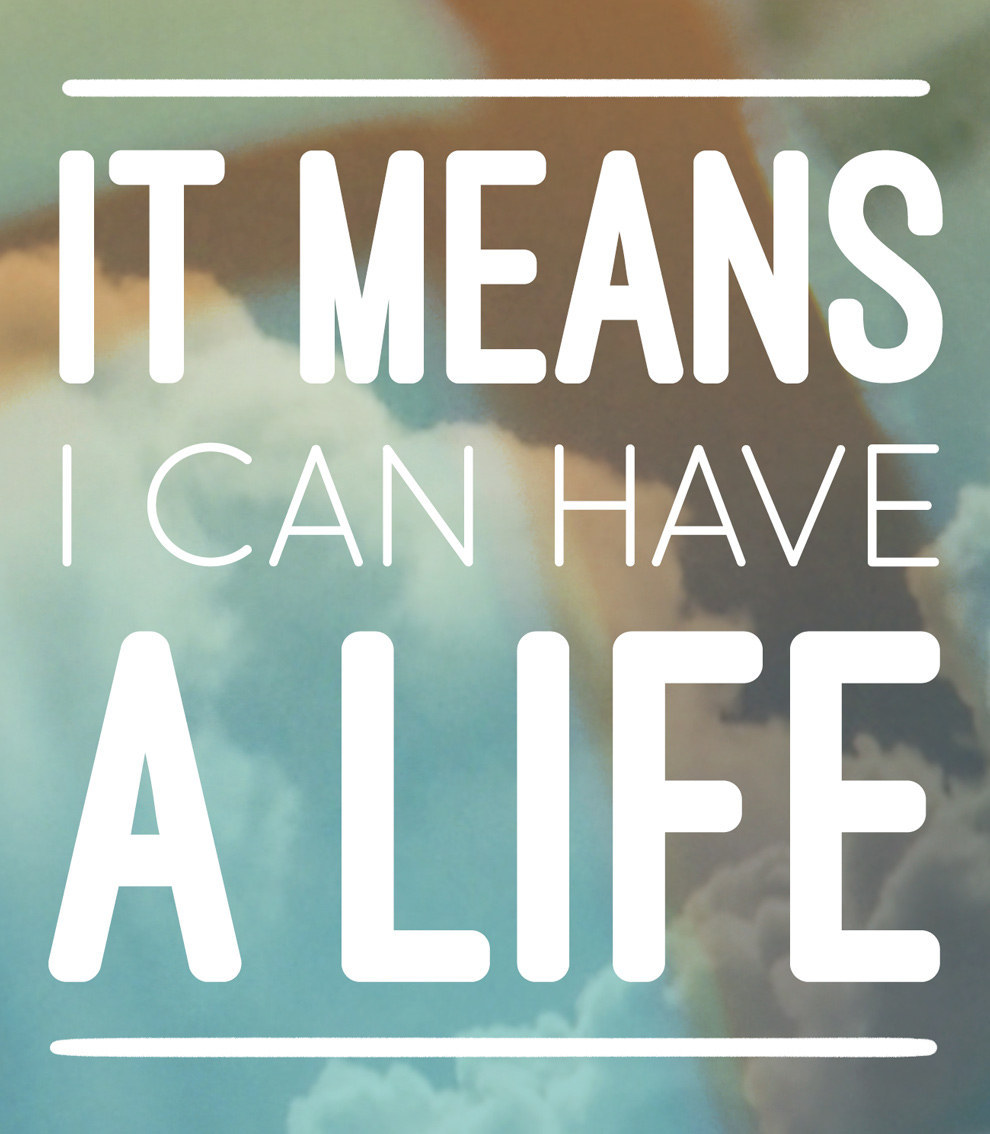
21. Because she was determined to finish her degree.
I've been on psychotropic medication since I was 12: for anxiety and depression at first, then, when I was diagnosed as bipolar around 17 years old, they added antipsychotics. The meds kept the racing thoughts at bay, and stopped the deep depressions as well as the manic episodes that had me rack up credit card debt of $3,000. Staying on these meds have allowed me to go to college at 22 years old, and curbed my meltdowns.
—Anonymous, email
22. Because panic attacks were taking over her life.
I've been off medication for almost two years now, but when I first started to take pills, my anxiety and panic attacks were truly taking over my life. It got to a point where I couldn't leave my house without having a meltdown. A psychologist suggested I should visit a psychiatrist, and he prescribed me lovely and expensive pills. At first they made me feel tired, but after a couple of days the panic attacks decreased, and anxiety stopped playing a major role in my life. They helped me when I most needed them, and now, thanks to a complete therapy, I can live my life the way I want to. I haven't had a panic attack in almost three years, but I know that if I ever need meds I can always go back.
—Jessica B., email
23. Because she wouldn't let stigma keep her from her goals.
For as long as I can remember, I've had issues with anxiety, and when I got into my teens I dove deep into depression after the loss of a family member. It was easy to think that I would grow out of it as I matured, but it's been several years and I still go through depressive episodes. My anxiety and lack of energy make it difficult to complete even the simplest of tasks, and being unable to do something as easy as answer the phone makes me feel ashamed. I can see that it is very frustrating for the people around me as well. I went to the doctor a couple of days ago to talk about mental health and what I can do. Counseling hadn't worked for me in the past, so I decided to ask for the extra help medication would offer. I have so many things I want to do with my life; why should I let the stigma of mental health stop me?
—Courtney Haid, email
24. Because she realized she couldn't just will her OCD away.
I've never had a problem accomplishing my goals when I put my mind to them — but OCD is different, because my brain is the problem. I had to get help. I went to a psychiatrist, who prescribed me Zoloft, and another medication for panic attacks. With the combination of cognitive behavioral therapy (CBT) and medication, my life has completely changed. My obsessions and compulsions have reduced by 90%. I don't have constant migraines from the stress of obsessions and compulsions, and I finally feel peace without the constant OCD dialogue in my head. If I were diagnosed with diabetes and needed insulin, no one would judge me for that. They wouldn't say that I should try to deal with it without meds. Why does this type of illness get treated by people so differently?
—Blair McDonald, email
25. Because after years of taking care of others, he decided to take care of himself.
Being a special education teacher, I'm always working with students with anxiety and depression, and sometimes multiple other diagnoses. My mom died from cancer when I was 20; a student of mine tried to commit suicide and another was hospitalized; my first real male friend in 20 years moved away; my co-worker was recently diagnosed with an aggressive form of breast cancer. I think it all finally caught up with me. I started yelling at my kids and getting really irritated with my wife and job. I knew I was depressed and started thinking about suicide. I went to a psychologist and he mentioned meds, and I instantly felt relieved. My doctor prescribed Trazodone to help me sleep, and Celexa for the depression. This is the first week in my almost 51 years where I've had little to no anxiety. What a relief; is this how it feels to be "normal"?
—Sean Penegor, email
26. Because agoraphobia made it hard to stay on track.
This past February I was diagnosed with a few anxiety disorders (general anxiety disorder, panic disorder, and agoraphobia). My agoraphobia made it extremely hard to get to class. Taking the subway and walking through crowds was absolute torture. Panic attacks were also making it difficult to sleep, and I had them every night. I needed something to get me on track. I planned on doing CBT (cognitive behavioral therapy), but if I couldn't even get to the hospital for it, it would never work. This is why I agreed to take antidepressants for my anxiety disorders. It takes a while to truly work, and it was not easy to get on it as I was sensitive to one of the side effects, but I am so thankful that I did.
—Joanne Roccaforte, email
27. Because she couldn't stay motivated.
I have borderline personality disorder; I am also bipolar. I used to be an unstable person and unable to perform at work. Clients would constantly make comments about how I would always be zoned out. I would try to best to act "normal," but it was impossible. Eventually I just stopped going to work, and I cut off everything and everyone because trying to function was just too painful and tiring. After I spoke with my psychiatrist, he put me on medication for my bipolar disorder and depression. Things started to change. I was able to focus more; I was able to start holding conversations; I started feeling motivated; I was able to go back to work. My life has been filled with more beauty ever since and I am much for hopeful about my ability to succeed in the future. Medication has brought life back into me.
—Rana El-ali, email
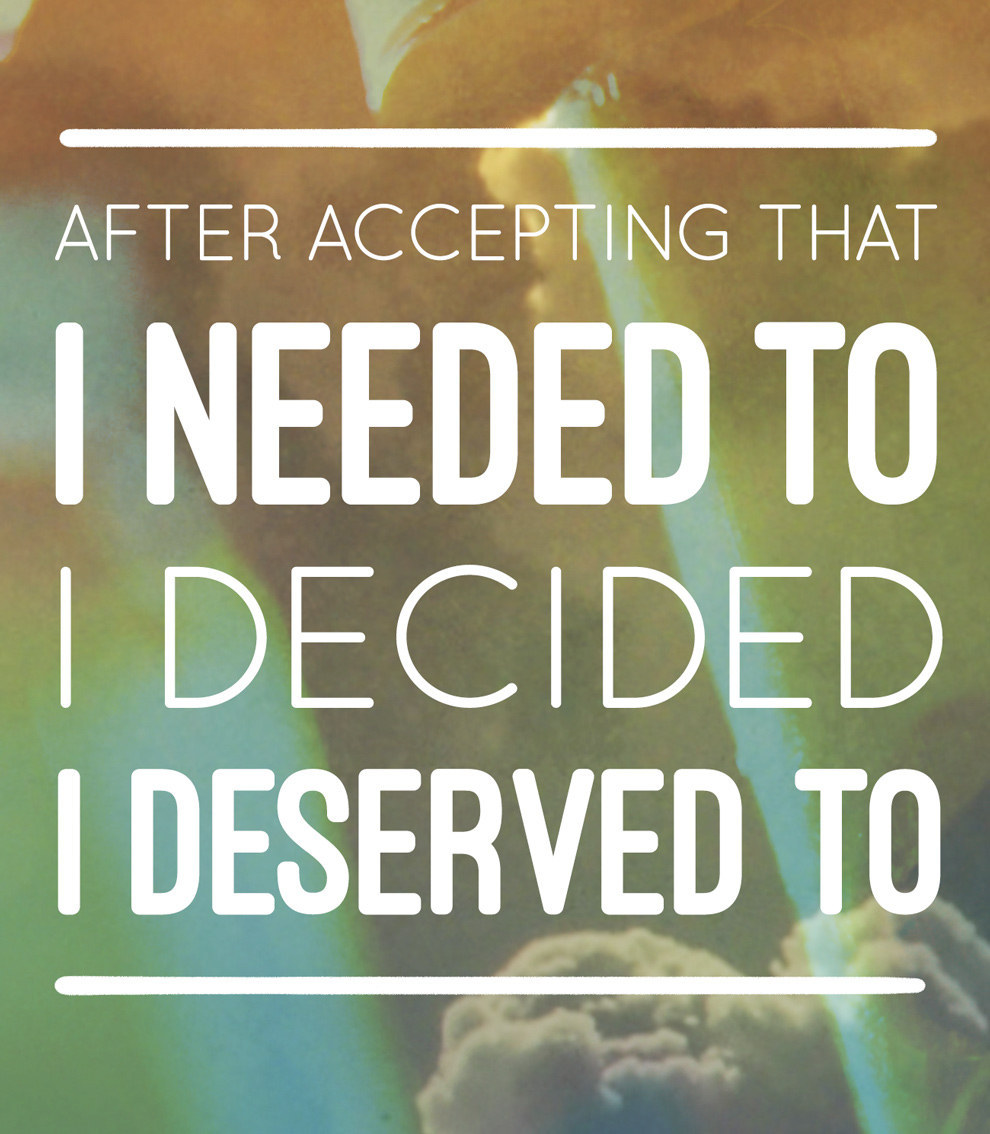
28. Because her anxiety was manifesting as binge-drinking and anorexia.
When I went away to college I began binge-drinking because it was the only way that I was free of my anxieties. On days that I was not drinking, my insecurities and worries consumed me. Trivial things — if a boy didn't text me back, for example — would set off panic attacks that would make my heart clench in my chest. I started obsessing over my popularity and appearance, starving myself and exercising like a maniac. I was never good enough and I was always worried sick about something. I couldn't relax unless I was drunk. I started going to a therapist and started taking Lexapro. My life has changed in the best way. My thinking is clearer and my judgments sounder.
—Anonymous, email
29. Because she realized medication didn't have to deaden her emotions.
When I was first diagnosed with anxiety and panic disorder, I was really against the whole idea of taking meds because I had heard stories of people's emotions getting completely flatlined. I've always been a super-emotional person, and as drastic as my lows could be, I always loved how excited and passionate I could get about things. I was so afraid I would lose that altogether. So, my therapist and I worked out a solution: I would start taking the supplement Inositol twice a day to see how I felt. Taking my consistent doses over the next few months, my head started to clear and my panic attacks were coming far less frequently. I take my mood stabilizers because I want to live a full life, where I can be in control of my own mind and say no to the thoughts that try to lead me down a dark path.
—Noelle, email
30. Because she needed help managing her grief.
My grandma Susie was my entire world. She was always so proud of me, and I loved her more than anything. One night, she had a heart attack while sleeping and just like that, she was gone.
My mom and I went on antidepressants together, along with going to therapy. I didn't want to at first. I felt like I was cheating, and that I wasn't grieving properly. I was afraid of the side effects; I was terrified I would become numb. But it became part of the healing process, and the antidepressants got me through my everyday life. With therapy, I learned how to recognize my depression, and how to work through those negative thoughts. There wasn't something wrong with me, and if I needed to take pills to recreate a balance in my life, I would do it, for me.
—Brooke S., email
31. Because she saw it as a practical solution.
I started medication when I was 17 when I was finally diagnosed with a generalized anxiety disorder. I take Cipralex for my uncontrollable fits of crying (which have affected me my whole life), anxiety attacks, and episodes of depression that were caused by the anxiety. As soon as I started, I felt happier, less unsure, and like I belonged in my own skin for once. I have had people ask me if I'm annoyed that I need Cipralex in order to "function," but I don't see it that way. I would rather be aware of my illness and know what works for me rather doing nothing and letting it fester and harm me emotionally. Now I'm in my third year of university, but in all honesty, without Cipralex, I would have broken down and quit during my second month.
—Emmy, email
32. Because she realized it was nothing to be ashamed of.
I've been medicated since 2007, seventh grade. I've gone through so many medications, and it's still hit or miss. What works today might not tomorrow, but maybe will again in a year. Roller coaster ride, for sure. Right now, I take Prozac, Klonopin, and sometimes Xanax. Not only do I suffer from generalized anxiety and depression, but I have OCD, too. I never talked about my medicine until last year, my junior year of college, after a friend killed herself. That's when I realized it was up to me to start a dialogue — like what I'm doing now. And guess what? A lot of my friends take medicine, too. We support each other, talk through things, and remind one another to take our medicine.
—Emily Nocito, email
33. Because medication helps her help others.
I have borderline personality disorder. You cannot imagine the nuclear war that goes off in my head when I am unmedicated.
One thing that really has helped me overall is that medication has given me my voice. I'm not afraid to speak out about what I have been through, and I have helped so many people at my place of employment (I'm studying to be an herbalist and work at a vitamin shop) just by telling my story. Medication helps me communicate with others, and break the stigma of what it means to be "crazy" in America. I take my medication so I can help others, so I can live MY life without shame of labels. I take my medication so my daughters can know that it's OK to have suffered through trauma, depression, eating disorders, and inpatient stays. I get to wake up and know that I'm making a difference.
—Anonymous, email
34. Because her seasonal affective disorder kept getting worse.
I had known for years that I was suffering from seasonal affective disorder (SAD), and it was getting worse. I tried many things over the years to avoid meds. Going to the gym helped quite a bit, but my work schedule changed several times and I couldn't go as often as I wanted. I got two Happy Light sunlight simulator lamps — one for home, and one for work. I started taking vitamin D3 5000IU daily. But I was still miserable. I would get angry or cry at the most inconsequential things. My best friend, who also has great difficulty through the winter, expressed concern several times, and told me this year the change was especially abrupt. My husband flat-out told me I wasn't myself. I told him I was considering making a doctor's appointment to discuss an antidepressant, at least for winter, and I'll never forget the look of relief on his face.
The next day, sitting in the doctor's office, crying to a doctor I had just met, I asked for help. We agreed I would try Wellbutrin, which is a common choice for SAD and doesn't tend to produce the weight gain or sexual side effects of many other antidepressants. That was Jan. 27, 2015, and I will never look back. It changed my life within three days. Don't get me wrong — it's still harder to get moving on gray days, but it's not debilitating any more. My only regret is not having asked for help sooner.
—Anonymous, email
35. Because she decided she deserves to feel better.
I take medication for my depression and anxiety because after accepting that I needed to, I decided I deserved to — that simple.
—Ashley E., email
Submissions have been edited for length and/or clarity.

All this week, we're talking about mental health. If you liked this post, you might also like these:
* How People Treat Mental Illness Vs. How They Treat Physical Illness
* 24 Things People With Generalized Anxiety Disorder Want You To Know
* 13 Incredibly Smart Tips To Be Happier From Mental Health Experts

